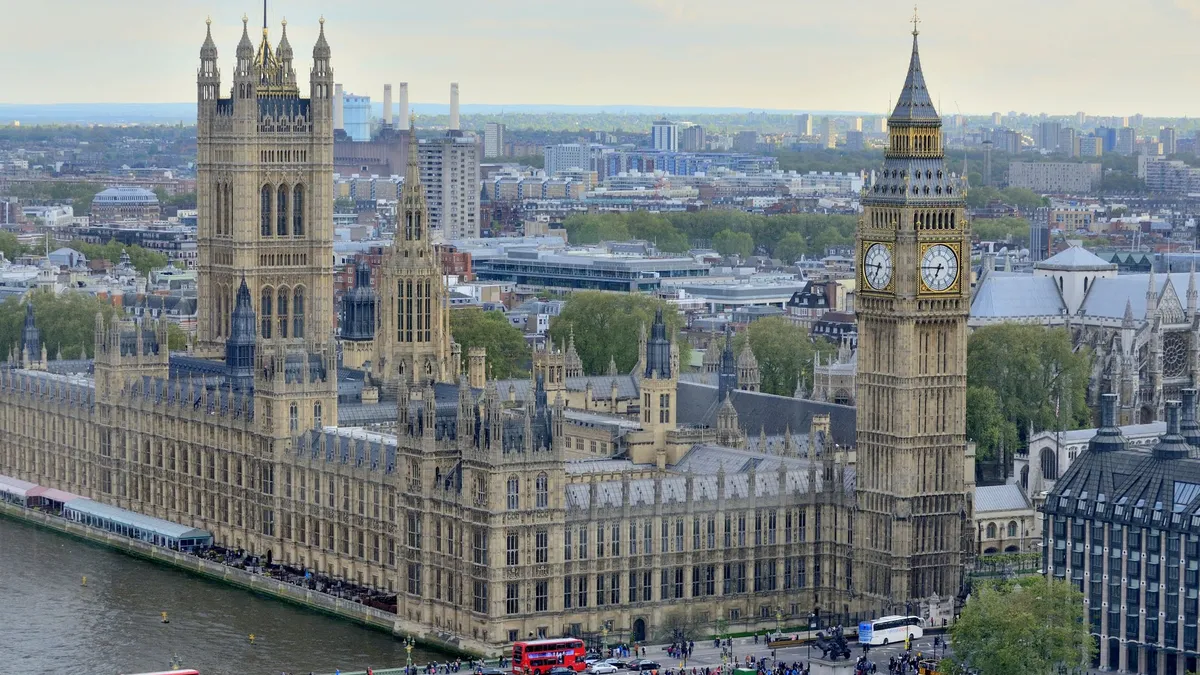UPDATE: March 14, 2019:
Members of the British Parliament voted 412-202 to delay the deadline for Brexit, which was scheduled for March 29. This now has to be approved by the European Union. The U.K. is looking to delay the deadline until June 30. Members also voted on an amendment that would have resulted in a second referendum, but this failed with a vote of 85-334.
Dive Brief:
- The British Parliament will vote today on whether or not to extend the March 29 deadline for approving a plan for leaving the European Union. This vote comes after Parliament rejected the idea of a "no-deal" Brexit with a close vote of 312 to 308 yesterday.
- Yesterday's vote does not guarantee that a "no-deal" scenario will be avoided however, which Prime Minister Theresa May made clear after yesterday's vote. "The legal default in UK and EU law remains that the UK will leave the EU without a deal unless something else is agreed," May said. "The onus is now on every one of us in this House to find out what that is."
- The vote seeking an extension is expected to pass, but what happens after that remains less clear. Parliament could approve another agreement, it could decide to do a second referendum, or it could decide to hold a general election.
Dive Insight:
"It’s unclear how long an extension the UK will request and whether the EU will approve it," Rachel Ellehuus, the deputy director of the Europe program at the Center for Strategic and International Studies, told Supply Chain Dive in an email.
The EU could question what good an extension would do at this point, given that two plans have now failed to pass and it is not clear where the U.K. government plans to go from here, Mark Blyth, professor of International Economics at Brown University, told Supply Chain Dive.
“There is no mathematical combination of votes that get you anything other than a hard Brexit," Blyth said.
However, Brendan O'Leary, professor of political science at the University of Pennsylvania, said there might be one possibility of for an agreement that can pass: the Norway option, which would allow the U.K. to remain part of the European single market, but it would have less say over shaping the rules since it wouldn't be an EU member.
There is also the real possibility of either a second referendum or a general election.
"Never before in the 20th Century, and I can’t even think of a moment in the 19th Century, has a Prime Minister and a Cabinet been defeated on their major legislative program, twice, without resigning and trigging a general election," O'Leary said.
But this would require the conservative members of Parliament deciding they want a new leader; it hasn't hasn't happened yet, "but it’s conceivable," O'Leary said.
A second referendum is also something that would be hotly contested. Those in favor say the public now has a more clear understanding of what they're voting on. But Blyth disagrees, saying nothing is any more clear at this point.
"I mean why not have a third one? Why not hold one every month?" he said.
O'Leary argued democracies allow people and governing to change their mind, so a second referendum is not outside the realm of possibility or legality.
All of this debate over the past few months has underscored just how much the U.K. economy relies on the EU and how interconnected those supply chains have become.
“It was a discovery to many in politics, both in Great Britain and in Ireland, the extent to which Ireland, the island of Ireland, was characterized by extensive, integrated supply chains with trucks crossing the border on a daily and scheduled-time basis with just-in-time management techniques applying to lots of agribusiness," O'Leary said.
Many businesses have been vocal opponents of a no-deal Brexit, which Parliament yesterday agreed with. But whether that can be avoided still remains unclear.
“The whole thing makes no sense," Blyth said. "The only thing you can say is it doesn’t make any sense. It’s an example of what happens when democracies delegate responsibility for making serious decisions to the public and then they have to live with the consequences without ever thinking through what they’re doing."














